Overview
Digital transformation in healthcare is not just beneficial; it is essential for enhancing patient care, improving operational efficiency, and effectively addressing the challenges posed by rising chronic conditions and clinical staff shortages. How can healthcare organizations thrive in this evolving landscape? Technologies such as AI, telemedicine, and Avato’s hybrid integration platform empower these organizations to streamline operations and deliver personalized, effective care. This reinforces the critical need for transformation within the industry. As a result, the adoption of these technologies is imperative for staying competitive and meeting patient needs.
Introduction
In the rapidly evolving landscape of healthcare, digital transformation stands out as a crucial catalyst for enhancing patient care and operational efficiency. This comprehensive shift integrates advanced technologies, data analytics, and innovative processes, fundamentally reshaping how healthcare organizations deliver services.
With the impending challenges of clinical staff shortages and rising patient expectations, leaders in the sector are increasingly optimistic about harnessing digital solutions to navigate these complexities.
From telemedicine to AI-driven diagnostics, the journey towards a more connected and patient-centered healthcare system is not merely a trend—it is an urgent necessity.
As organizations strive to meet the demands of modern healthcare, understanding the key elements of this transformation becomes essential for achieving better health outcomes and ensuring sustainable success.
Defining Digital Transformation in Healthcare
Technological transformation in the medical field signifies a comprehensive integration of electronic technologies, data analysis, and innovative processes aimed at enhancing care for individuals, streamlining operations, and improving wellness outcomes. This transformation encompasses a variety of technologies, including electronic health records (EHRs), telemedicine, and mobile health applications, all designed to promote a more efficient and patient-centered system.
This shift is not merely about adopting new technologies; it represents a fundamental change in how organizations operate and provide services. As we approach 2025, industry leaders are optimistic about leveraging technological solutions to address major challenges, such as clinical staff shortages, while simultaneously reducing expenses and enhancing experiences for individuals receiving care. Indeed, approximately 75% of organizations have already embarked on their technological transformation journeys, underscoring the critical importance of digital transformation in healthcare.
Avato’s hybrid integration platform plays a vital role in this transformation by offering a reliable and comprehensive data and systems integration foundation. This platform enables medical organizations to seamlessly connect fragmented legacy systems, thereby facilitating improved operational efficiency and enhanced client care. By integrating separate systems and data, healthcare providers can implement new technologies such as AI and VR more effectively, ultimately leading to enhanced, interconnected user experiences.
To effectively manage technological transformation, organizations should consider five essential steps:
- Evaluating current capabilities
- Establishing a clear strategy
- Investing in appropriate technologies
- Promoting a culture of innovation
- Consistently measuring progress
Avato’s hybrid integration platform supports these stages by ensuring that data moves effortlessly between systems, thus establishing a robust foundation for future advancements.
A significant case study demonstrating effective transformation is the University of Louisville’s initiative to enhance autoimmune neurology care. Faced with challenges like duplicate test orders and missed essential tests, the Department of Pathology and Laboratory Medicine developed an evidence-based algorithm to standardize ordering practices for high-cost autoimmune and paraneoplastic panels. The results were remarkable, achieving 100% sensitivity and 71% specificity, which led to a 33% increase in true positive rates for relevant antibodies and an estimated savings of $54,900 in diagnostic costs.
This case illustrates how targeted online initiatives, supported by Avato’s robust integration platform, can effectively address operational challenges and improve care for individuals.
The incorporation of technological advancements underscores the significance of digital transformation in healthcare for enhancing care for individuals. Effective training in these systems promotes smoother adoption, ultimately improving workflow and client outcomes. As decision-makers allocate budgets, they should recognize the critical importance of digital transformation in healthcare by prioritizing solutions that not only address current challenges but also position organizations in the medical field for future success.
By 2025, the impact of these technologies is expected to be substantial, with a major emphasis on enhancing individual care and operational efficiency, reflecting the optimism of industry leaders.
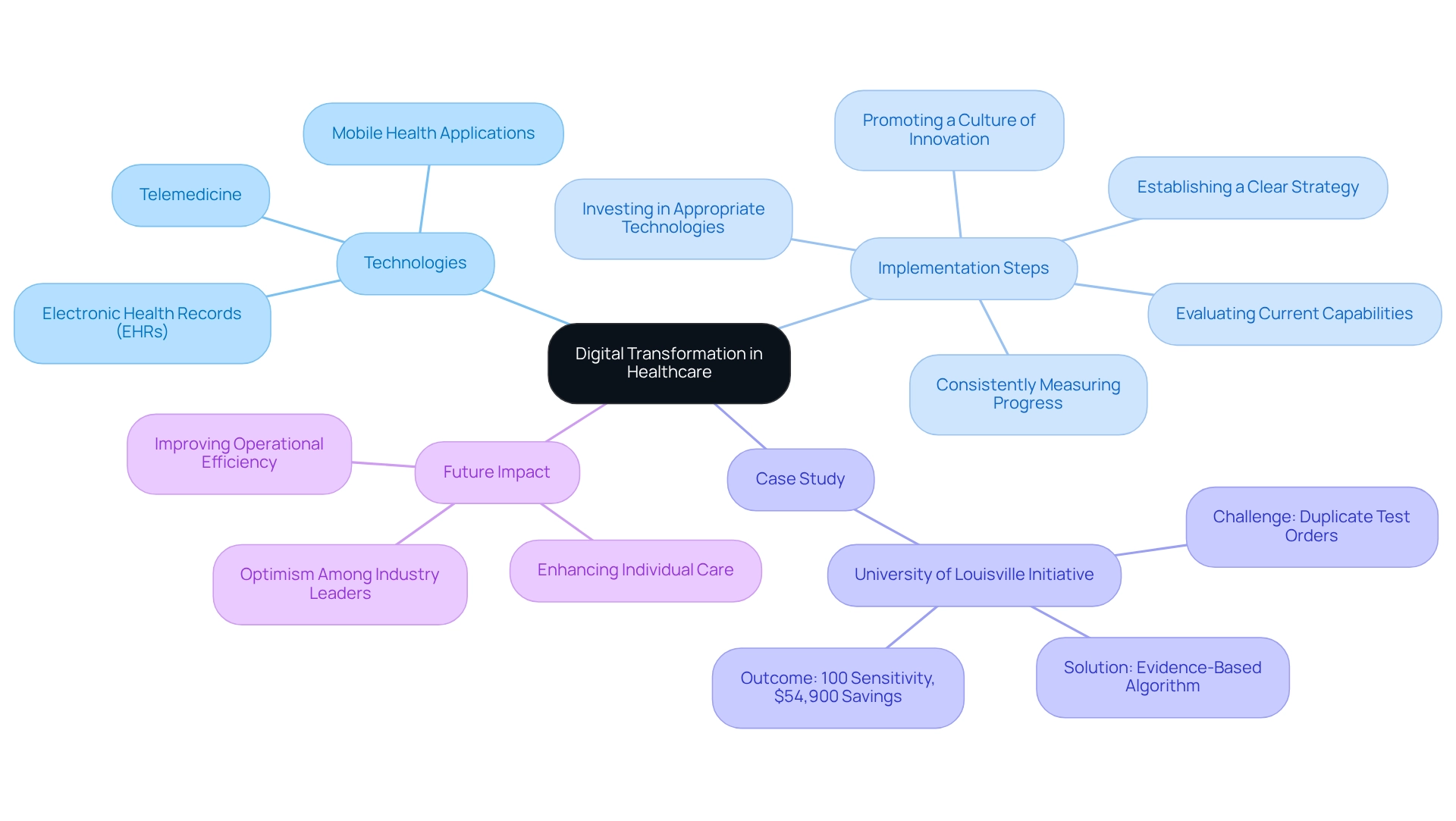
Why Digital Transformation is Essential for Healthcare Organizations
The significance of digital transformation in healthcare is an imperative for medical organizations, propelled by the escalating demand for personalized care, the necessity for operational efficiency, and the relentless pressure to reduce costs. As consumer expectations evolve—evidenced by 50% of individuals relying on online reviews as much as personal recommendations—medical providers must leverage technology to deliver timely and effective care that meets these emerging standards. This shift underscores the urgent need for healthcare institutions to adopt technological solutions that enhance user experiences while aligning with their operational strategies.
Organizations that proactively embrace digital transformation can secure a substantial competitive edge. By optimizing operations and boosting patient satisfaction, they can ensure compliance with industry standards while tackling the challenges posed by clinical staff shortages. Alicia Janisch, Vice Chair and US Health Care Sector Leader at Deloitte, emphasizes this point: “Recognizing the value of staff and providing them with the tools to become more productive can lead to a healthier, more motivated, and efficient workforce.”
This perspective highlights the critical importance of equipping personnel with the necessary resources to navigate the complexities of modern medical practice.
Accelerating technological transformation is a foremost priority for health systems globally, aiming to enhance efficiencies and elevate staff productivity. Avato’s hybrid integration platform has played a pivotal role in simplifying intricate integration projects, enabling organizations to swiftly and efficiently achieve their integration objectives. By maximizing and extending the value of legacy systems, Avato empowers medical providers to manage integrations seamlessly while significantly curtailing costs.
Moreover, the platform offers real-time monitoring and alerts regarding system performance, allowing organizations to proactively oversee their operations. Customers such as John Johnstone from OSME Pacific and Gustavo Estrada from BC Provincial Health Services Authority have commended Avato for its ability to deliver results within specified time frames and budget constraints. This showcases how technology can markedly enhance operational efficiency by addressing the challenges of integrating isolated legacy systems and fragmented data.
Avato originated from a group of enterprise architects who recognized the need for a more effective approach to integrating disparate systems and data. Their commitment to resolving complex issues in a simpler manner led to the birth of Avato. As we approach 2025, the importance of digital transformation in healthcare for medical organizations cannot be overstated.
It not only enhances individual care but also fosters an environment where tailored support can thrive, ultimately yielding improved wellness outcomes and a more resilient medical system. Furthermore, care systems should evaluate alternative service locations and invest in digital resources to meet shifting client expectations, ensuring they remain competitive in a dynamic landscape.
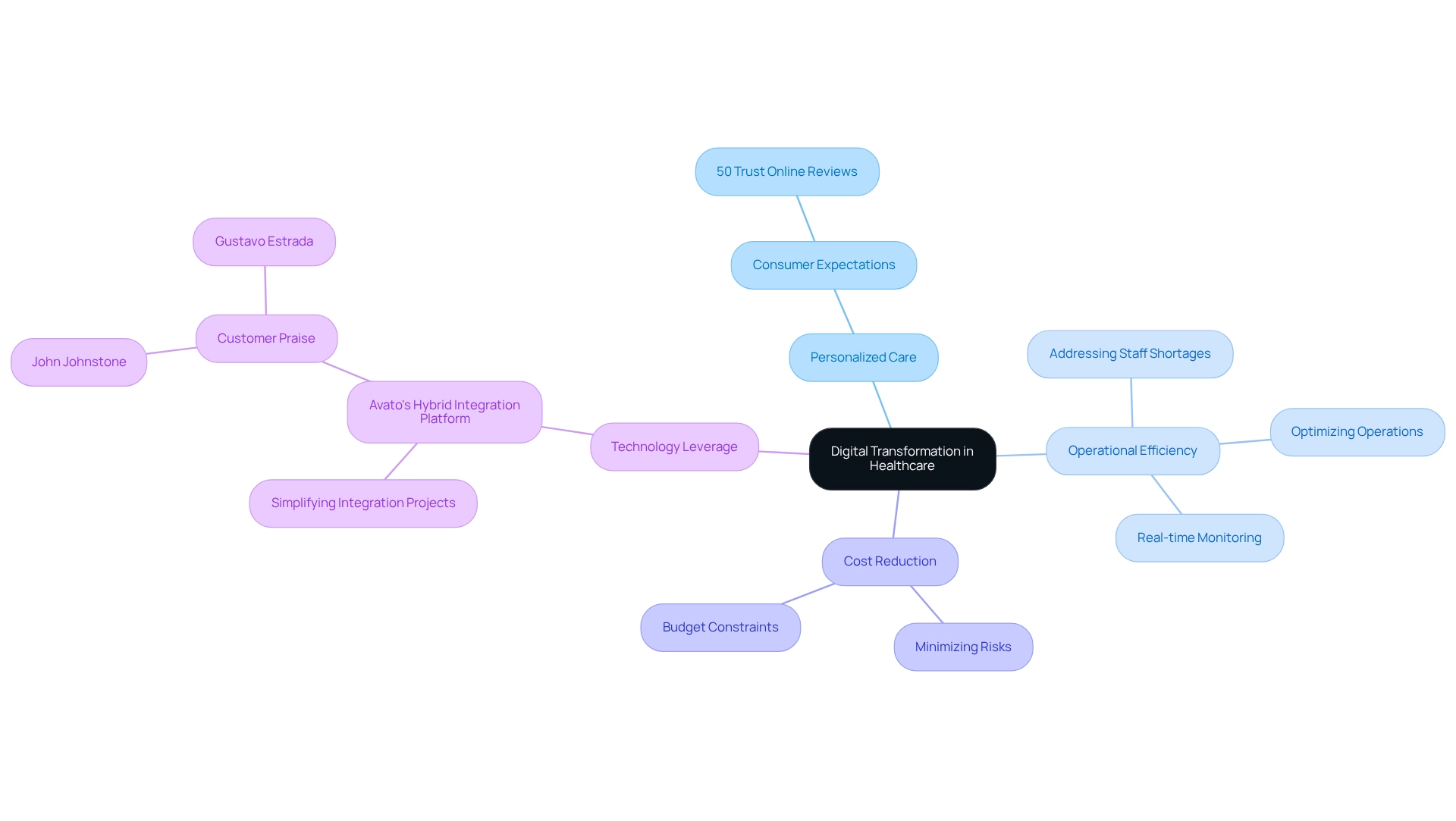
Addressing the Rise of Chronic Conditions through Digital Solutions
The increasing prevalence of chronic conditions, such as diabetes, heart disease, and obesity, represents a formidable challenge for healthcare systems worldwide. By 2025, nearly half of all adults in the U.S. are projected to be living with at least one chronic condition, highlighting the urgent need for effective management strategies. Digital solutions—especially remote individual monitoring, telemedicine services, and mobile wellness applications—underscore the critical importance of digital transformation in healthcare to address these challenges.
Remote individual monitoring facilitates ongoing wellness tracking, empowering individuals to actively manage their conditions. This approach not only enhances engagement but also improves adherence to treatment plans, leading to better health outcomes. For example, studies indicate that individuals utilizing remote monitoring tools experience a 30% increase in adherence to prescribed therapies compared to their counterparts who do not.
Moreover, integrating data analysis into these electronic solutions allows medical providers to identify patterns and anticipate potential medical emergencies. By analyzing real-time data, providers can enact timely interventions, significantly decreasing hospital readmission rates and enhancing overall patient care. Avato’s Hybrid Integration Platform is pivotal in this context, maximizing the value of legacy systems, simplifying complex integrations, and substantially reducing costs, all while ensuring 24/7 uptime for critical systems.
This reliability is essential for the successful implementation of electronic wellness solutions within healthcare environments. As noted in the Health of Canadians, 2024 report, addressing social determinants of well-being is vital for improving outcomes. Factors such as access to nutritious food and safe exercise environments directly influence personal wellness behaviors, making it imperative for online wellness solutions to incorporate these elements into their design and implementation. Karen Hacker, MD, MPH, from the National Center for Chronic Disease Prevention and Wellness Promotion, emphasizes that “to achieve equity in well-being, these innovations must adopt nuanced strategies with equity in mind.”
In summary, the rise of chronic conditions accentuates the necessity of digital transformation in healthcare, necessitating a robust digital health strategy. By leveraging cutting-edge technologies, including Avato’s reliable technology stack, medical providers can effectively address the challenges posed by chronic diseases, ultimately leading to improved outcomes for individuals and a more efficient healthcare system. Furthermore, the integration of AI and VR technologies is revolutionizing care delivery, personalizing the medical experience and enhancing data accessibility, which is crucial for empowering users and improving treatment effectiveness.
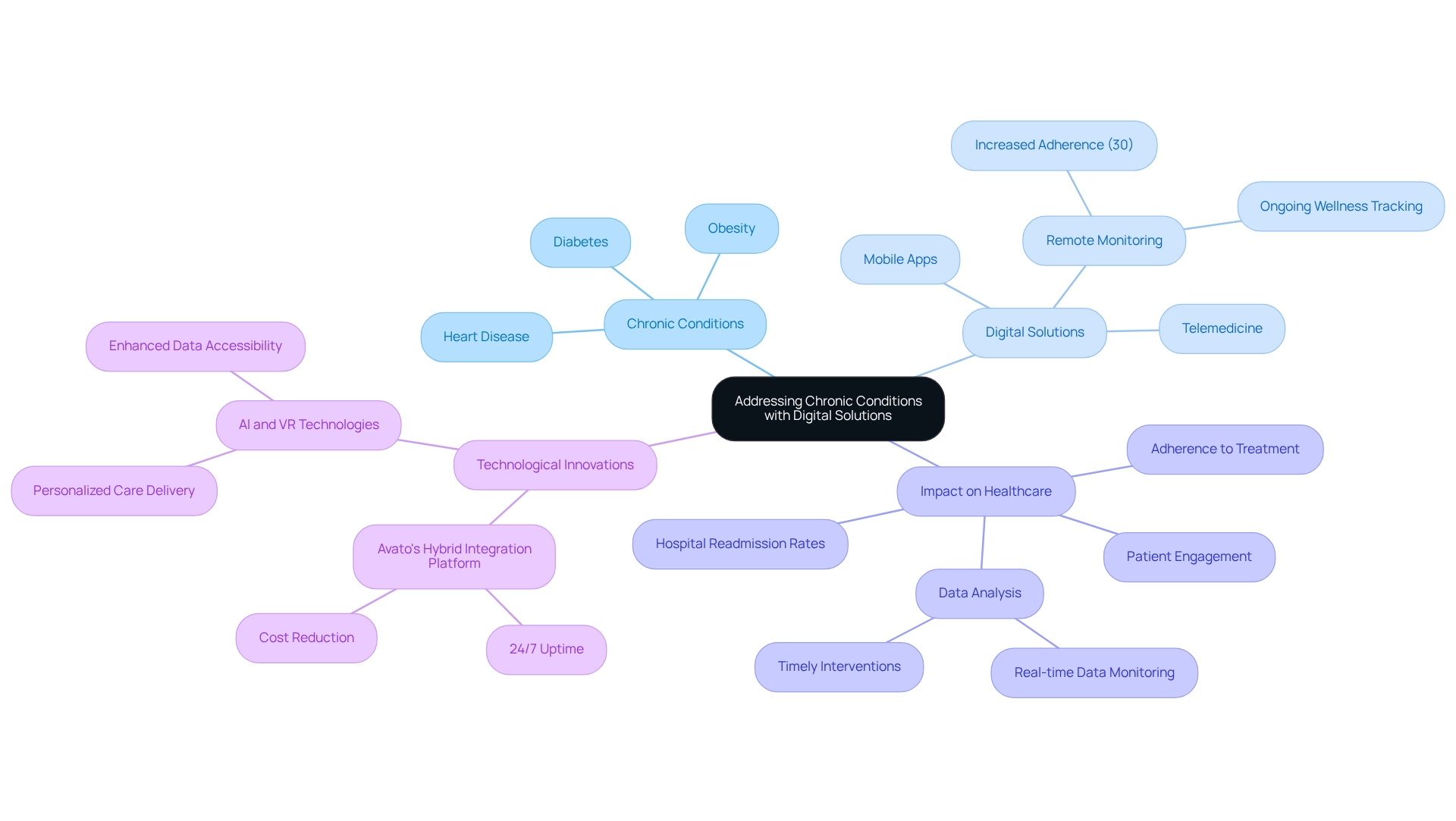
Key Technologies Driving Digital Transformation in Healthcare
Multiple crucial technologies are driving technological change in the medical field, each contributing distinctly to the sector’s advancement:
-
Artificial Intelligence (AI): AI is transforming the medical domain through predictive analytics, diagnostics, and tailored treatment plans. By 2025, AI adoption in medical settings is expected to significantly enhance diagnostic precision and individual outcomes. Notably, over 60% of digital wellness users employ AI medical assistants for monitoring symptoms and managing chronic conditions, underscoring their essential role in care. Furthermore, a recent study revealed that 78% of users reported a better understanding of their lab results when utilizing AI-driven explanations, illustrating the technology’s impact on safety and data interpretation.
-
Telemedicine: This technology has become indispensable, enabling medical providers to consult with individuals remotely and thereby enhancing access to care. The surge in telemedicine adoption reflects a broader trend towards more adaptable medical delivery models, particularly effective during recent global wellness challenges.
-
Wearable Devices: Gadgets such as smartwatches and fitness trackers facilitate continuous monitoring of well-being and data collection. These tools empower individuals to take an active role in their health management, leading to improved health outcomes and increased engagement.
-
Blockchain: By enhancing data security and interoperability, blockchain technology is vital for safeguarding individual information and ensuring seamless communication among diverse medical systems. Its implementation is expected to grow as organizations prioritize data integrity and security.
-
Cloud Computing: Cloud solutions are revolutionizing data storage and sharing, enabling medical providers to access patient information securely and efficiently. This technology supports the scalability and adaptability required in contemporary medical settings, fostering improved collaboration among providers.
Avato’s Hybrid Integration Platform plays a crucial role in recognizing the importance of digital transformation in healthcare by effectively utilizing these technologies. The platform underscores the significance of digital transformation in healthcare by facilitating seamless integration of AI, telemedicine, wearable devices, blockchain, and cloud computing, ensuring that medical organizations can leverage these innovations effectively. It enhances data interoperability and security, allowing medical providers to deliver improved patient care and operational efficiency.
The upcoming years are critical for realizing AI’s transformative potential in medicine, with ongoing advancements poised to redefine diagnostics and patient care. The financial impact of AI technologies, such as AI-driven autonomous vehicles generating over $170 billion in annual revenue globally, underscores the urgency for the medical sector to embrace these innovations. Successful telemedicine implementations across various medical organizations further demonstrate the effectiveness of these technologies in enhancing care delivery and operational efficiency.
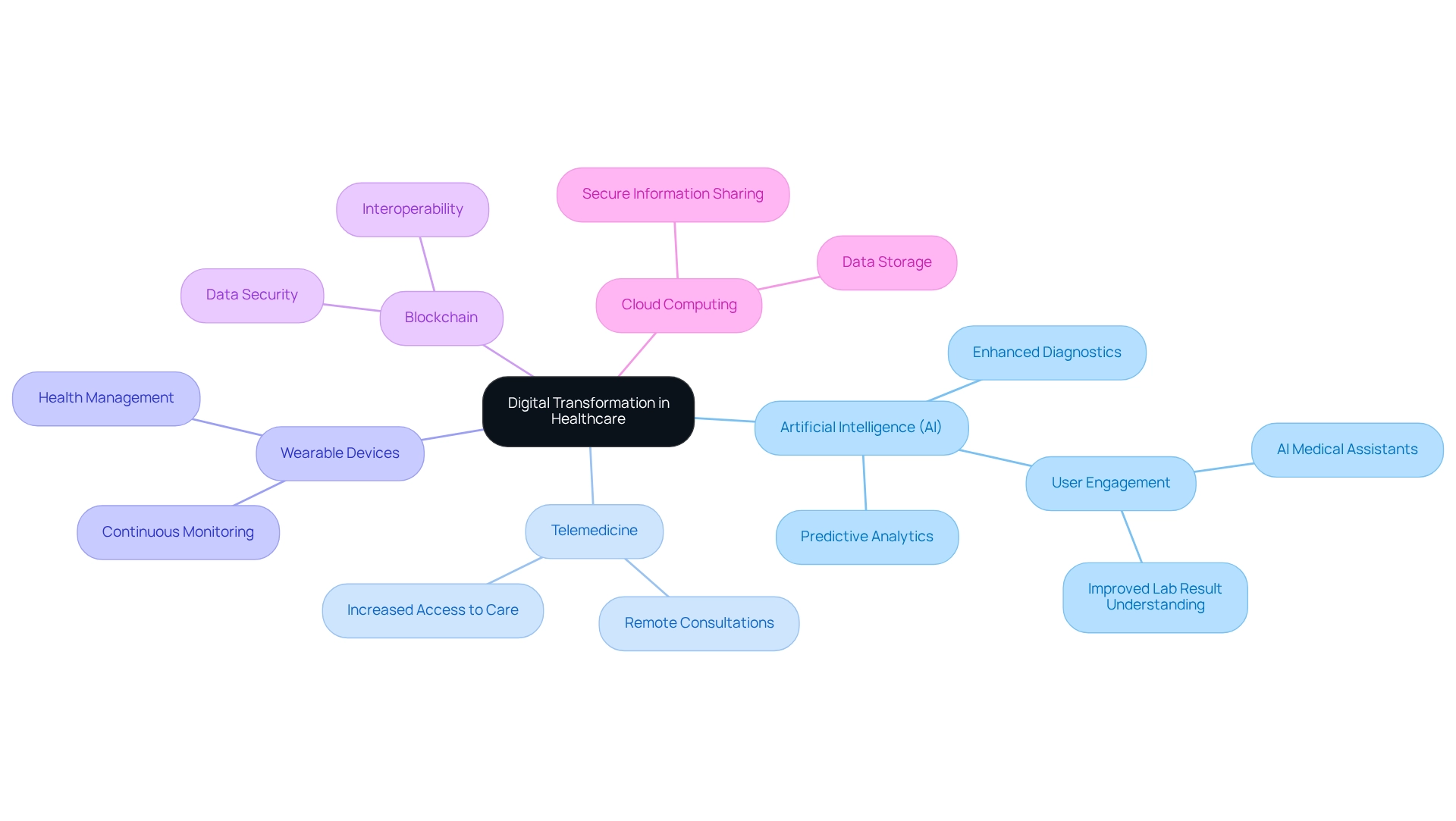
Challenges and Barriers to Digital Transformation in Healthcare
Despite the significant advantages that digital transformation can offer, medical organizations face numerous challenges that can hinder progress, underscoring the critical need for digital transformation in healthcare. Key among these challenges are:
- Data Privacy and Security: Protecting sensitive patient information is paramount, especially given alarming statistics indicating that over 90% of cyberattacks in the medical sector are phishing scams, as noted by Megan Garza, Communications Manager for Varonis. The stakes are high, as evidenced by recent breaches, such as the one at Landmark Admin, which exposed personal data of over 800,000 individuals. These incidents highlight the urgent necessity for robust cybersecurity measures.
- Integration with Legacy Systems: Many medical providers continue to rely on outdated systems, presenting significant challenges when integrating with modern technologies. This challenge is compounded by the fact that 22% of all cybersecurity incidents in the medical field originate from insider threats, often linked to these legacy systems. Successful integration is essential for enhancing operational efficiency and ensuring data security. To address these challenges, organizations must effectively mobilize stakeholders to gather requirements accurately from the outset and utilize the right technology and tools to illustrate both the current and ideal states of their systems. Preparing systems for the future is also crucial to guarantee compatibility with emerging tools and technologies.
- Resistance to Change: Employee hesitance to adopt new technologies can obstruct transformation initiatives. Concerns about disrupting established workflows often lead to resistance against adopting innovative solutions, which can stall progress and limit the potential benefits of modernization. Involving stakeholders in the process modeling of new business practices can help alleviate these worries and foster a culture of acceptance.
- Cost of Implementation: The financial burden related to technological transformation can be overwhelming, particularly for smaller medical organizations. The investment required for new technologies, training, and ongoing support can deter many from pursuing necessary upgrades, despite the long-term savings and efficiencies they may yield. Future-proofing systems to integrate new tools with existing assets can mitigate some of these costs over time.
- Regulatory Compliance: The complex landscape of medical regulations presents another layer of difficulty. Organizations must navigate a myriad of compliance requirements, complicating the implementation of new technologies and processes. As state attorneys general continue to monitor HIPAA violations, the pressure to maintain compliance remains high, with no fines or settlements reported in 2025. This ongoing scrutiny underscores the necessity for medical organizations to prioritize adherence in their technological transformation strategies.
These challenges emphasize the importance of digital transformation in healthcare, as medical entities must implement strategic methods for technological transformation to effectively manage data privacy issues while integrating legacy systems with new technologies. Furthermore, the persistent occurrence of incidents involving the loss and theft of Protected Health Information (PHI) suggests that, although advancements have been made, there remains a considerable risk linked to the management of both electronic and paper records in the medical sector. By leveraging Avato’s expertise in stakeholder engagement and process modeling, organizations can navigate these challenges more effectively and achieve successful integration outcomes.
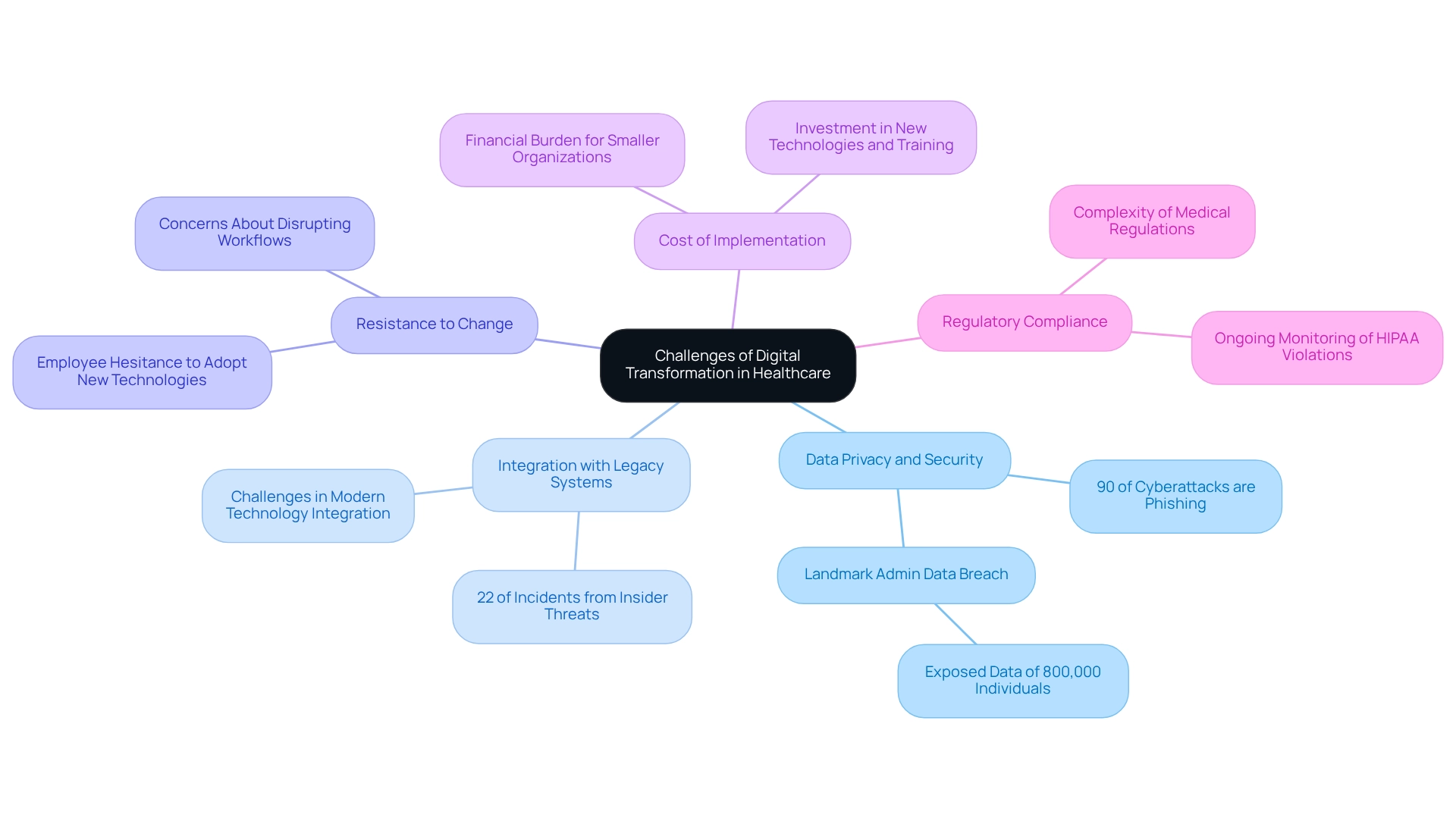
Benefits of Digital Transformation for Healthcare Providers
The advantages of technological transformation for medical providers are considerable and varied, including:
-
Enhanced Patient Outcomes: Technological solutions improve access to information and enable personalized care, significantly contributing to improved health results. For instance, studies indicate that telemedicine can enhance access, quality, efficiency, and cost-effectiveness in medical services globally. Furthermore, innovative methods such as virtual reality (VR) and artificial intelligence (AI) are being employed to personalize patient care, providing therapies with reduced side effects and enhanced engagement.
-
Improved Efficiency: By optimizing processes, technological transformation lessens administrative loads, enabling medical professionals to focus more on patient care. This efficiency is essential in a setting where medical demands are continually increasing. Avato’s hybrid integration platform plays a vital role in simplifying complex integrations, ensuring that providers can focus on delivering care rather than managing fragmented systems.
-
Cost Savings: Implementing digital solutions can lead to considerable operational cost reductions. By reducing paperwork and enhancing resource distribution, medical organizations can attain substantial financial advantages, allowing them to reinvest in care for individuals and innovation. Avato’s architecture is crafted for secure transactions, establishing it as a reliable collaborator for affordable solutions in banking, medical services, and government sectors.
-
Improved Client Involvement: Digital tools enable individuals to actively participate in managing their well-being, leading to increased satisfaction rates. Involved individuals are more likely to follow treatment plans and engage in preventive care, which ultimately results in better health outcomes. The application of AI-driven avatars, demonstrated in recent developments, can offer individuals personalized guidance and assistance, further boosting their involvement.
-
Data-Driven Decision Making: Access to real-time information equips providers with the insights necessary to make informed decisions rapidly. This capability is essential for adapting to the fast-paced changes in medical environments and enhancing overall service delivery. A future with accessible information, where individuals manage their personal data, is crucial for achieving the complete promise of technological advancement.
-
Expert Opinions on Technology’s Role: Specialists highlight that to tackle obstacles in medical services, thorough regulations for telemedicine must be created and broadly implemented. Stanberry B. observes that this regulatory structure is crucial for ensuring that electronic solutions are effectively incorporated into medical systems.
-
Case Studies on Enhanced Outcomes: A significant instance is the electronic transformation in Saudi medical education, which emphasized the pressing requirement for specialized IT health programs. The results from this research highlight the significance of synchronizing medical education with global standards to encourage innovation and enhance outcomes for individuals.
In conclusion, the incorporation of technological solutions in medicine underscores the importance of digital transformation in healthcare, as it not only boosts operational efficiency but also serves a crucial function in advancing outcomes for individuals, ultimately resulting in a more efficient and responsive medical system. Systemic changes in medical finances, education, and infrastructure are essential for attaining technological innovation, ensuring that the advantages of transformation are completely realized.
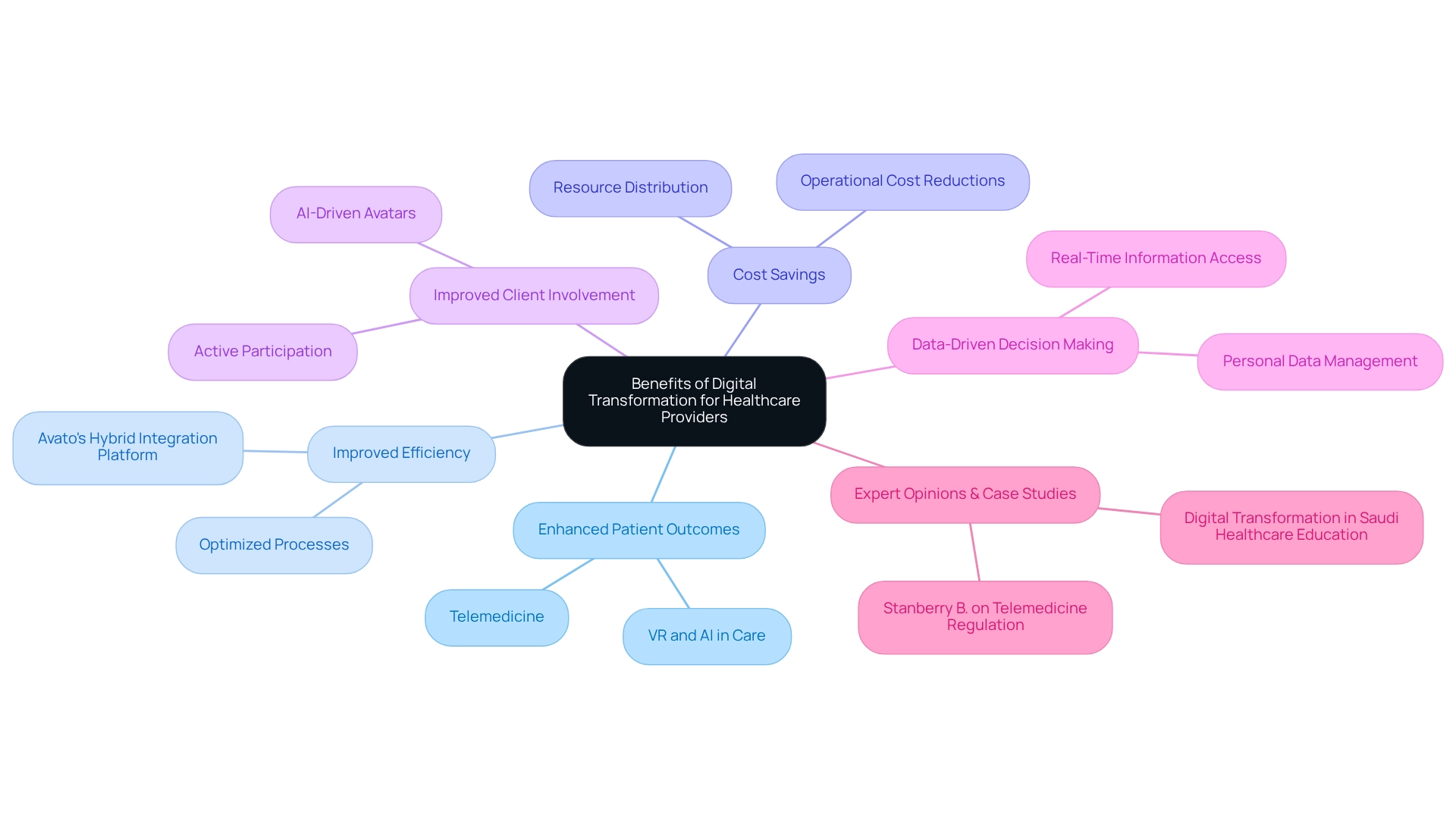
Case Studies: Successful Digital Transformation in Healthcare
Many medical organizations have achieved considerable progress in their digital transformation initiatives, showcasing the significance of digital transformation in healthcare through inventive strategies that enhance care for individuals and operational efficiency. These advancements are often supported by hybrid integration solutions such as those provided by Avato.
- Mayo Clinic: By embracing telemedicine, Mayo Clinic has successfully broadened access to healthcare services for individuals in remote areas. This initiative has not only enhanced satisfaction among individuals receiving care but also resulted in improved health outcomes. It illustrates the effectiveness of virtual care in decreasing emergency room visits and extending care delivery beyond conventional settings. Recent statistics indicate that client satisfaction rates have soared, with many individuals reporting a seamless experience during telehealth consultations. However, only 20% of respondents recognized the importance of digital transformation in healthcare, stating they were leveraging data effectively. This highlights the challenges faced by medical organizations in this area. Avato’s hybrid integration platform can help address these challenges by facilitating better data utilization.
- Cleveland Clinic: The integration of AI-driven diagnostics at Cleveland Clinic has transformed evaluations of individuals seeking care. This technology has streamlined processes, significantly reducing wait times and enhancing diagnostic accuracy. The success of this initiative underscores the potential of artificial intelligence to revolutionize healthcare delivery, making it more efficient and responsive to individuals’ needs. Avato’s hybrid integration solutions can further enhance these AI capabilities by ensuring seamless data connectivity across systems, allowing for more comprehensive insights on individuals.
- Kaiser Permanente: With the implementation of a comprehensive Electronic Health Record (EHR) system, Kaiser Permanente has improved care coordination and patient engagement. This transformation highlights the importance of digital transformation in healthcare, as it has led to better health management and reduced costs through effective data integration that enhances the overall healthcare experience. Avato’s dedication to architecting technology foundations supports such initiatives by unlocking isolated assets and enabling business value creation through its hybrid integration platform.
- SickKids Hospital: SickKids Hospital’s transformation strategy is centered around creating a seamless online experience for families. By focusing on enhancing care delivery and operational efficiency, the hospital has positioned itself as a leader in pediatric care, ensuring that families receive timely and effective support. Avato’s solutions play a crucial role in facilitating this seamless experience through secure data sharing and analysis, which is essential for improving patient outcomes.
These case studies emphasize the critical role of digital transformation in healthcare, underscoring the necessity for technological advancement in medical services. Secure data exchange and analysis are vital for enhancing medical outcomes. As Amy Abernethy, MD, PhD, noted, ‘The complexity of medicine now exceeds the capacity of the human mind,’ which further underscores the importance of digital transformation in healthcare. Moreover, interoperability among medical systems and public welfare organizations can enhance data sharing and promote equity in medical services.
As the sector continues to evolve, entities that utilize technology efficiently, like Avato, will be better prepared to face the challenges of contemporary medical services. The integration of diverse health data sources can deepen understanding of health and disease, improve population health, and facilitate collaborative research efforts among various stakeholders.
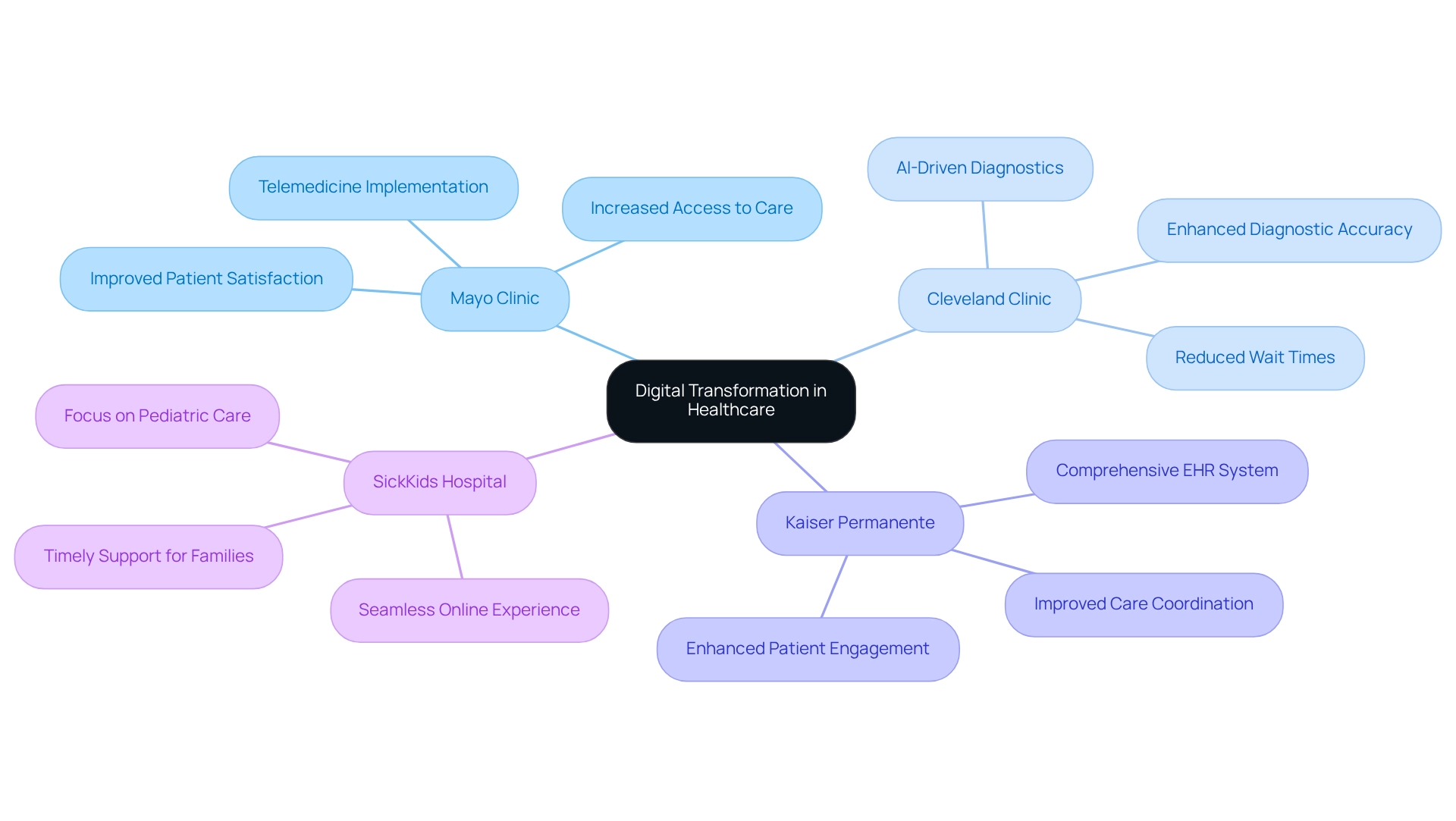
Future Trends in Healthcare Digital Transformation
Looking ahead, several transformative trends are poised to redefine digital transformation in the medical field:
- Increased Use of AI and Machine Learning: These technologies are set to revolutionize diagnostics and treatment personalization, significantly enhancing operational efficiencies. AI systems are already employed in primary care diagnostics, assessing images of skin lesions to offer immediate insights. This capability decreases waiting times, providing quicker reassurance for low-risk individuals while enhancing overall efficiency in medical service delivery.
- Expansion of Telehealth Services: With a growing preference for remote care, telehealth is anticipated to become a standard practice in medical service delivery. By 2025, telehealth services are projected to see substantial growth, driven by patient demand for convenience and accessibility. Avato’s secure hybrid integration platform ensures 24/7 uptime for critical integrations, essential for maintaining reliable telehealth services and supporting complex systems in banking, healthcare, and government.
- Integration of IoT Devices: The Internet of Things (IoT) will play a crucial role in enabling real-time wellness monitoring and data collection. Avato’s platform facilitates the incorporation of IoT devices, boosting user engagement and resulting in better health outcomes through ongoing monitoring and prompt interventions.
- Focus on User-Centric Care: Future technological solutions will increasingly emphasize user experience, ensuring care is customized to individual needs and preferences. This shift towards patient-centricity is essential for fostering trust and satisfaction in medical services. The role of digital medicine, encompassing AI and VR, is crucial in humanizing care and improving the overall experience.
- Blockchain for Data Security: The adoption of blockchain technology is expected to enhance data security and interoperability, effectively addressing privacy concerns critical in the medical field. Avato’s platform facilitates secure sharing of individual data across systems, ensuring adherence to regulatory standards and improving data accessibility.
As we approach 2025, expert forecasts highlight the essential role of AI and machine learning in shaping the future of medical services. These technologies are not only anticipated to enhance operational efficiencies but also fundamentally change care delivery. However, as Thomas Davenport points out, the greatest challenge to AI in these medical fields is ensuring its adoption in daily clinical practice.
The integration of AI into daily clinical practice remains a challenge, yet its potential to streamline processes and enhance decision-making is undeniable. The ongoing advancements in telehealth and IoT further illustrate the dynamic healthcare landscape, emphasizing the importance of digital transformation to meet evolving patient needs. Additionally, administrative applications of AI, such as RPA for claims processing, aim to improve efficiency, although concerns about chatbot usability and confidentiality persist.
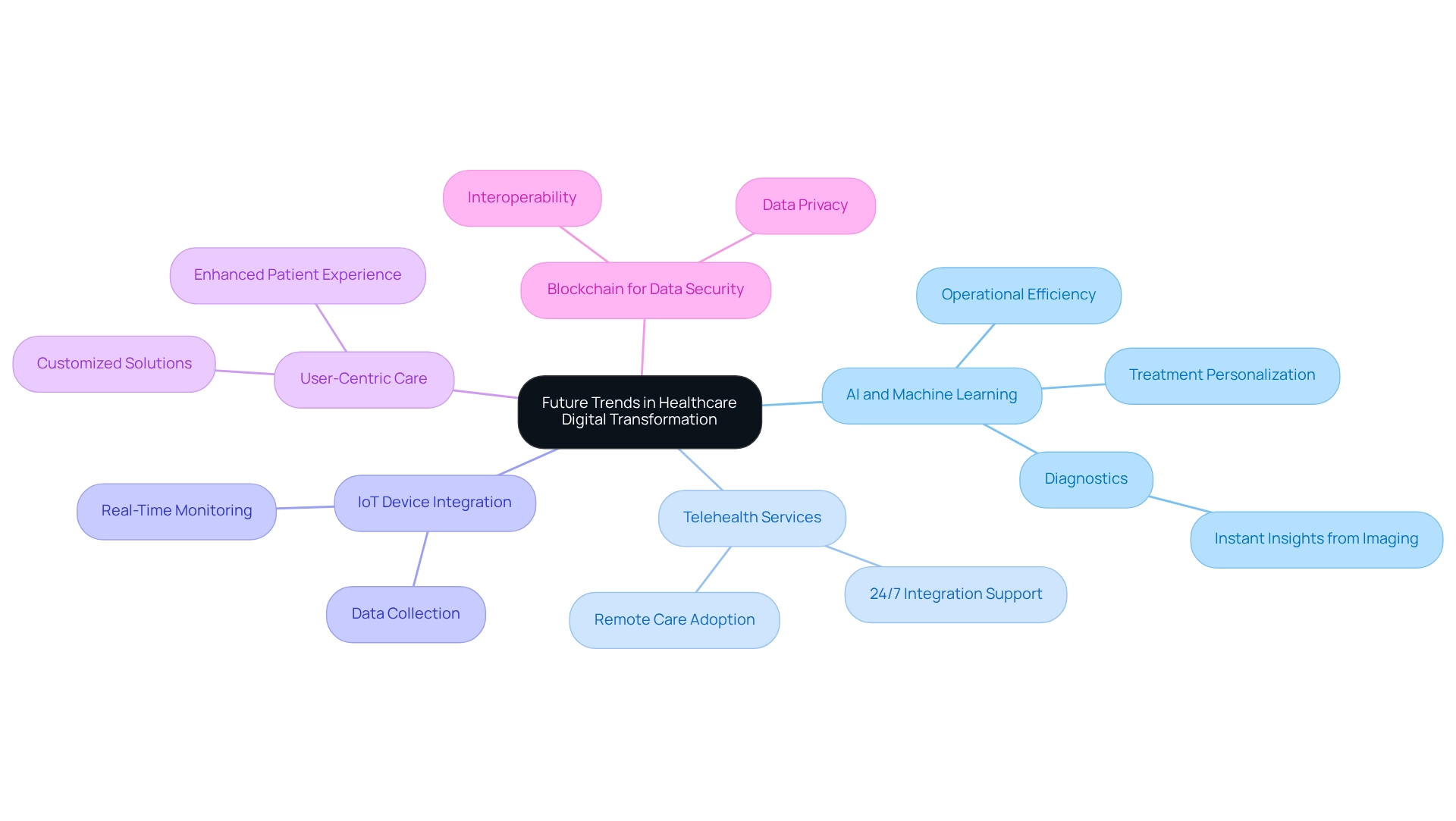
Conclusion
Digital transformation in healthcare is not merely a trend; it represents an essential evolution that confronts the pressing challenges of modern healthcare delivery. By integrating advanced technologies such as AI, telemedicine, and data analytics, healthcare organizations can significantly enhance patient care, streamline operations, and improve overall health outcomes. The urgency of this transformation is underscored by the growing demand for personalized care, the need for operational efficiency, and the necessity to reduce costs amidst clinical staff shortages.
Successful digital transformation involves a strategic approach that includes:
- Assessing current capabilities
- Defining clear objectives
- Investing in the right technologies
- Fostering a culture of innovation
Real-world case studies, such as those from Mayo Clinic and Cleveland Clinic, demonstrate that organizations leveraging digital solutions not only improve patient engagement and satisfaction but also achieve substantial operational efficiencies and cost savings.
Looking towards the future, the continued advancement of technologies—such as AI, telehealth, and IoT—will play a pivotal role in shaping a more connected, patient-centered healthcare system. Nevertheless, challenges remain, including:
- Data privacy concerns
- Integration with legacy systems
- Resistance to change
Addressing these barriers is crucial for healthcare organizations to realize the full potential of digital transformation.
The healthcare sector stands on the brink of a technological renaissance. Embracing digital transformation is vital for organizations aiming to thrive in an increasingly complex environment. By prioritizing innovation and leveraging the right tools, healthcare providers can not only meet the evolving expectations of patients but also build a more resilient and effective healthcare system for the future.

